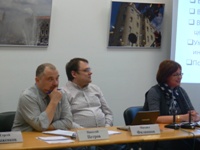Registration
You will receive an email confirming your registration.
IMGXYZ2927IMGZYXRussia’s current political system is unable to create the conditions necessary for economic modernization, which can only flourish where political competition exists. Consequently, Russia first needs to reform its political system. The Carnegie Moscow Center hosted a presentation of the Liberal Mission Foundation’s research project Risks and Limits of Political Modernization in Russia. Irina Busygina of the Moscow State Institute of International Relations and of the Higher School of Economics and Mikhail Filippov of Binghamton University in the United States presented the first stage of the research project, and Sergey Ryzhenkov of the Russian State University for the Humanities and Natalia Zubarevich of Moscow State University commented on the research. Carnegie’s Nikolay Petrov moderated.
Economic Modernization
- The state’s role: Only the state can create the impetus for economic growth and economic modernization in Russia, Busygina said. She asserted that if the state in its current form acts as the main guide for economic modernization, Russia will be unable to free its economy from its strong dependence on raw materials exports.
- The need for political modernization: The Russian state is unable to carry out real economic modernization at the moment because there is no political competition in Russia. Without competition, the state’s effectiveness decreases while corruption increases. Economic modernization thus depends on political modernization.
Political Modernization
Busygina argued that successful political modernization is possible only in the long term.
- A period of risks and checks: Even if the state enacts real political reform, economic modernization will only be possible after a lengthy period of heightened risks, Busygina said. She described this as “a period of worsening in the situation rather than a period of expectations for near improvement.” Corruption and crime would increase, property rights would weaken, and threats to national territorial integrity would become increase. These dangers result from Russia’s lack of political competition and the government’s suppression of independent media before the assumed political changes take place, the weakness of Russian civil society and the absence of deeply held democratic traditions in the country.
- Shaping the period of risks and checks: A number of factors will shape this period of risks and checks, said Busygina, including:
- How long democracy has been in place in the country and the quality of state administration, given that partially democratic countries and young democracies often suffer even more from corruption than authoritarian regimes when trying to carry out political reforms;
- A country’s levels of wealth and poverty, as among two equally impoverished countries, there is often less corruption in that country which is less democratic;
- How successfully the reforms are implemented.
- How long democracy has been in place in the country and the quality of state administration, given that partially democratic countries and young democracies often suffer even more from corruption than authoritarian regimes when trying to carry out political reforms;
- Risks of political institutional reform: The bigger the country and the more diverse its society, the greater the inherent risks to institutional reform, said Busygina. Conflict in Russia over which institutions are important and need preserving—and which do not—is inevitable.
- The danger of stopping the political modernization process: Each stage of reform sees the emergence of groups of “early victors,” who obstruct the continuation of reform because they fear losing what they have already obtained. It is in the interest of most of these “victors” to see the transition period last as long as possible, with reform dragging on for an unspecified time, Filippov said. This means that political modernization could be brought to a halt at any point, leaving the situation even worse than it was before modernization began.
Commenting on the results of the project’s first stage, Ryzhenkov said that greater attention should be given to specific actors in the political process that would have a direct impact in shaping the nature of reform, and to their interests.
Summing up the discussion, Zubarevich noted that political reform in Russia is not so much essential as inevitable: the economic situation is worsening and a state with no democratic competition and public control inevitably starts to weaken sooner or later. This will make the state even more ineffective and lead to its decentralization. Zubarevich said that if Russia does not undertake political modernization, it could find itself facing political unrest.
